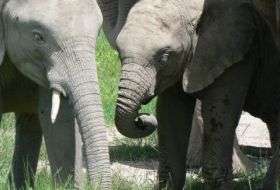How do elephants keep in touch?

An African elephant can recognize dozens of kin by the signature smell of urine, and uses its powerful nose to keep track of their whereabouts, according to a study published Wednesday.
Scientists have found that elephants use their excellent memories and sense of smell to keep contact in the jungle - by recognising each other by their urine.
The researchers from the University of St Andrews studied how elephants keep track of up to 30 members of the same group when they travel. Elephants face a particular challenge because groups regularly change composition and individuals don¿t walk in a fixed order.
Psychologists Dr Lucy Bates and Professor Richard Byrne discovered that elephants in Kenya were able to recognise fellow group members by the scent of their urine deposits. They not only used this information to identify individuals but were able to `remember' where particular elephants were, or should have been, at a specific time.
While several animal species have been shown to identify individuals from the scent of urine, this is the first time such an ability has been discovered in elephants.
Professor Dick Byrne explained, "It's hard enough for us humans trying to keep tabs on each other when there's only four or five family or friends out shopping together: imagine if there were 20 or 30 of you, and not a mobile phone between the lot! For elephants, which typically travel in family groups of that size, the problem is even harder because their day vision is not good. Worse, groups shift in composition from week to week, and individuals don't walk in a fixed order."
"However elephants have two potential advantages over humans: an excellent sense of smell, and - if their popular reputation is anything to go by - a good memory."
Working in Kenya with members of the Amboseli Trust for Elephants, the researchers tested elephants' abilities to recognise individuals by the scent of their urine. They found that elephants had an interest in samples that were deposited earlier from an absent family member.
The researchers also tested how elephants keep track of members currently travelling with the group and found that elephants were `surprised' to find urine samples in the `wrong' place.
"We put down deposits in places where they couldn't actually have been made, because the elephant in question was actually behind the group," Dr Bates explained. "We reckoned that only if each elephant was continually updating its memory of where everyone was, and was able to identify specific individuals from their urine, would they show any different reaction to this case. Indeed our elephants showed a strong `surprise' reaction to samples from a family member who was actually behind them at the time."
Professor Byrne continued, "For most tourists visiting Africa, the least exciting thing about seeing elephants is when they stop to urinate. Yet for the elephants themselves, those urine deposits help them keep constant track of up to 30 other individuals in their large and frequently changing family groups: a memory feat which we can only admire."
The research is published online by the Royal Society Journal.
Source: University of St Andrews















